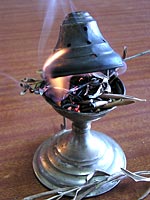
Burning olive leaves, locally known as tütsü, is believed to ward off the "evil eye".
 |
the north cyprus travel guide |
 |
|
Olive Leaf Burning (Tütsü)
A Unique Turkish Cypriot TraditionIf you get invited into a North Cyprus home for a birthday or other celebration, you may encounter an unusual Turkish Cypriot custom, the burning of olives leaves. One member of the family will fill a special burner called a tütsü with olive leaves, and wave the resulting smoke towards you. Never fear, this is not an indication that you need to take a bath more often, but a traditional way of warding off the evil eye. The smoke should protect you from harm. Read more about evil eye beads in North Cyprus. In south Cyprus, doors are often decorated with a wreath of olive leaves on New Year's Eve, called an "abvrossilla". This is not to ward off the evil eye, but to encourage a visit and blessing by St Basil, a figure not unlike Santa Claus. Similar Olive Leaf Burning Tradition in MaltaThe tradition of burning olive leaves also exists in a slightly different form on the island of Malta. On Easter Sunday, the local priest will bless the village houses, and Malta homeowners are given some olive leaves. This tradition dates from the time when the Maltese used to burn olive leaves to fumigate their houses – and ward off the evil eye. Amongst the Bedouin tribes of the Negev, an account exists of a method of driving the evil eye from sick animals. "(He) took dry chicken manure, guano of pigeons and dry olive leaves, mixed these with coals in a bowl and placed it before the ram in such a way that the smoke rising from the bowl entered the ram's nostrils and drove away the evil eye." (We think that a smell like that would probably drive anything away!) Interestingly, the Bedouins also believe in the power of blue beads to ward off the evil eye, just as in North Cyprus. Olive Leaf Extract - A Powerful AntioxidantScientists have discovered that olive leaf extract can help protect against a variety of viral and bacterial infections, and also contains a powerful antioxidants. You can buy olive leaf extract capsules that claim to improve the regulation of blood pressure, and you can also buy olive leaf tea to help your digestive system. The active ingredient in olive leaf extract (and in olives themselves) is a glycoside called oleuropein which makes the fruit bitter if eaten straight from the trees. Eating olives are usually processed in brine for some weeks, during which the oleuropein compound leeches out. The tradition of burning olive leaves may simply stem from the good farming practice of burning old olive cuttings, to remove any remaining disease, and invigorate the trees for the next year harvest. The cuttings from the trees would have also provided a welcome source of extra firewood for the olive growers during the winter months. |
|
North Cyprus quick: holidays | flights | hotels | property | kyrenia | famagusta | photos | map | weather | history | news
All text is copyrighted by Cyprus44. Photographs are copyrighted by their respective photographers.
For more information read our copyright policy, privacy policy and disclaimer.
This web page is served on 13 April 2025 at 8:52:45 PM.
![]()
Cyprus44 in other languages: Nordzypern | Chypre Nord | Severní Kypr | Северный Кипр
partner sites: goNorthCyprus Travel | Pacific Rent-A-Car | Amy Holiday Villas | other partner sites







